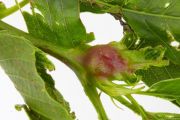Greater protection for sweet chestnut trees in England

Scientists are stepping up the fight against an invasive tree pest of sweet chestnut trees - Oriental Chestnut Gall Wasp - the UK’s Chief Plant Health Officer announced today.
Approval has been given for the release of a parasitoid wasp called Torymus sinensis, a natural biological control agent, to help reduce the spread of Oriental Chestnut Gall Wasp in England to protect the health of sweet chestnut trees.
This method of natural pest control works by using Torymus sinensis to kill the Oriental Chestnut Gall Wasp, thereby controlling the pest in England.
Oriental Chestnut Gall Wasp was first found in England in 2015. The wasp causes galls on the buds and leaves of sweet chestnut which damage the tree. In high numbers, the gall wasp can weaken sweet chestnut trees and make them more vulnerable to other pests and diseases, including Sweet Chestnut Blight.
Torymus sinensis is already present naturally in England but in very low numbers. Further releases of the parasitoid will enable the population to build up to a level to effectively control Oriental Chestnut Gall Wasp. This method of biological control is used successfully in many countries across Europe.
Chief Plant Health Officer Nicola Spence said: “Threats to sweet chestnut trees have increased as a result of tree pests and diseases such as Oriental Chestnut Gall Wasp and Sweet Chestnut Blight. The release of this biological control agent represents a huge step towards protecting the health of sweet chestnut trees and will further enhance the resilience of our treescape.”
Today’s announcement follows extensive research commissioned by the Department for the Environment Food and Rural Affairs in partnership with Fera Science Ltd, a thorough risk assessment and careful testing to ensure the safe, controlled release of the parasitoid in the UK.
The release of any biological control agent is carefully regulated, and the release gained governmental approval after robust scientific review, including by the Advisory Committee on Releases to the Environment and a public consultation. Fera Science Ltd will sensitively control the release, with a programme of monitoring for the next 10 years.
Senior Scientist at Fera Science Ltd Neil Audsley said: “Following an extensive programme of research and thorough risk assessment, we are now able to release a biological control agent to reduce the population of Oriental Chestnut Gall Wasp. Biological control is the safest and most effective means to manage pests such as Oriental Chestnut Gall Wasp. This strategy has been successfully used in countries across Europe and will directly contribute to improving the health of sweet chestnut trees in England.”
The release of Torymus sinensis is part of the government’s long-term strategic response to managing threats from tree pest and diseases to achieve the goals of the Tree Health Resilience Strategy (2018). Working in partnership with world leading scientists and colleagues from the Forestry Commission and the Animal and Plant Health Agency, Defra will continue to protect England’s sweet chestnut trees from existing and emerging threats.

